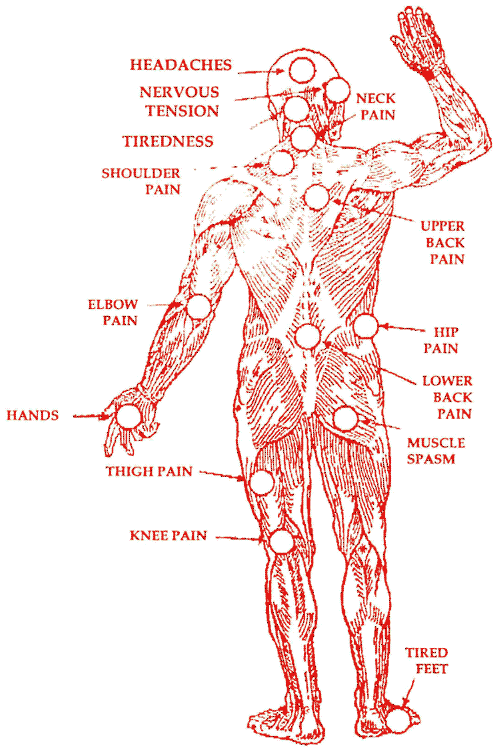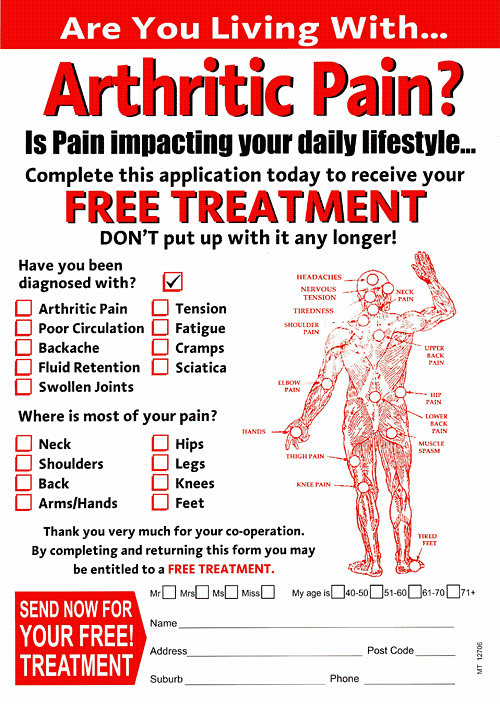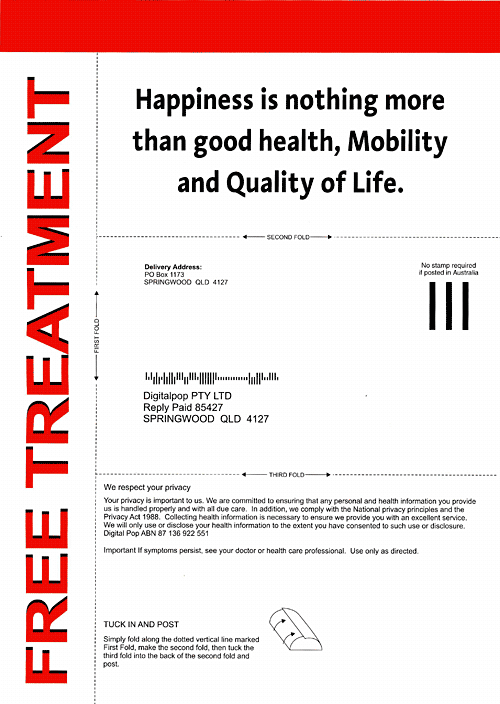UPDATE: A terribly nice chap asked me to take this post down. I didn't.
In among the supermarket flyers that fell out of today's issue of the local newspaper was this intriguing single glossy page:
Note the subtle change from a promise of FREE TREATMENT for your Arthritic Pain at the top of the page, to "you may be entitled to a FREE TREATMENT", boldface mine, in smaller print further down.
Note also the invaluable diagram to remind any forgetful elderly readers of the parts of their body which they might care to concentrate on, in hopes of feeling some pain there:

The reverse of the flyer:
(I've put the plain text of the flyer at the end of this post, to help searchers find it.)
These people may be 100% kosher, and their promise of some undisclosed kind of pain relief that may or may not be free may be given in entirely good faith.
I am a horrible, cynical person, though, so I have my doubts.
Pain relief is the gold-standard undisputed champion of things that placebos, and woo-woo alt-med nonsense that is in truth actually just a placebo, can treat.
This is a good thing. If you believe your pain is reduced, then your pain is reduced. Hurrah!
It's not like believing a small electrical gadget is curing your cancer when it isn't. Tumours are objective things, but pain is subjective. If you think it's gone, it's gone.
This doesn't, however, mean that anyone offering quote "free" unquote asterisk double-asterisk dagger double-dagger section-sign pain treatment to arthritis sufferers should be left alone to sell whatever it is they're selling.
For one thing, someone making this sort of offer may not be selling a true placebo. The classic example in alt-med arthritis treatment is Traditional Chinese Medicine arthritis pills, often called "black pearl" pills, which have on many occasions been found to simply contain plenty of normal non-Traditional-Chinese-Anything painkillers and anti-inflammatories.
On the plus side, this makes those pills work really well. But unknowingly taking large doses of steroidal anti-inflammatories, benzodiazepines and plain old paracetamol (a compound whose sole shortcoming as a painkiller is a rather narrow therapeutic index, the difference between an effective dose and a toxic one...) is a good way to end up unexpectedly hospitalised, or dead. Especially if you're as old as the average buyer of arthritis medication.
(The sellers of such medicines usually refer to the presence of real medicines in their woo-woo pills as "contamination". It is a wonder which passeth all understanding that "contamination" of alternative medicines always seems to involve substances that do what the alternative medicine is supposed to do. Never speed in the sleeping pills, never codeine in the erectile-dysfunction pills. A mystery, indeed.)
And then there are the alt-med treatments which are actually actively harmful. Poisonous, but otherwise placebo, anti-pain medicine may actually work better against pain than a sugar-pill placebo; if it's got obvious unpleasant side effects, then it must be powerful stuff!
(See also, sellers of worthless medicines who put warnings on them that say, for instance, that they should not be taken by pregnant women. And sham surgery, the most powerful placebo there is!)
Elderly people are ideal customers for a lot of scam artists. The perfect customer is someone who's losing their marbles but unaware of it - the dottier you become, the less qualified you are to detect your dottiness, and the more likely you are to conclude that you've made a solid deal when someone more compos mentis than you can see you're being thoroughly ripped off.
If Grandad's sliding into senility but hasn't (yet) had control of his finances taken away, he will be disproportionately likely to hurl large portions of said finances at door-to-door fake home repairers, worthless investments, phone scammers pretending they're from Microsoft, and of course the world's extraordinarily large supply of cashier's-cheque overpayers and Nigerian princes.
(Just this moment I myself received a very attractive e-mail offer from "MR.ALEX GOODWILL", who appears to be quite a prolific philanthropist.)
And, of course, there are also many older people who are just desperate for something, anything, to stop everything from hurting all the time. They may be as suspicious of a "Free treatment! Honest!" flyer like this as I am, and just as sure that whatever it is, it probably won't actually be free, but they're willing to try it anyway, in pursuit of even a slim chance of making their life a little more worth living.
Personally, the second I saw this flyer I was ready to bet money I had borrowed from Jimmy the Toecutter that this offer, whatever it was, was some sort of alt-med woo-woo BS.
But again, who knows, it might be totally legit. So I did a little digging.
When I searched for chunks of text from the flyer all I found was this Word document on a server belonging to the New Zealand Advertising Standards Authority. It's a complaint about a very similar-sounding flyer, including the helpful body diagram. But that flyer actually named the provider of the alleged treatment - "Niagara Healthcare".
(Niagara's response is a pretty great piece of weaseling, and a successful one, too; the complaint was not upheld!)
Perhaps my flyer had nothing to do with Niagara, though. So I searched for "Digitalpop", the name of the company on the postage-paid response thing, and "niagara". And hey presto, DigitalPop are listed as the ad agency for Niagara here in Australia.
I don't know if that'd stand up in court, but it's good enough for me. And even if this flyer by some quirk of fate doesn't have anything to do with Niagara, I think they're still a mob worth writing about.
Niagara are, you see, in the motorized-massage-gizmo business. Here's their Australian site. They sell handheld massagers, chairs with motorized rubby things in the upholstery, and other such things, including adjustable chairs and beds that help the infirm to get up, and so on.
They don't actually list any prices, though. Not on their Australian site, not on their UK one, and not on this US site either. That last site does have this Sale page proudly offering a ten-inch-thick queen-sized memory-foam mattress for a mere $US699, down from $US1499. I'm sure it is far, far better in many very convincing ways than the superficially strangely similar memory-foam mattresses you can get for three to four hundred dollars on eBay. Doubtless those are all cheap crap that will fall apart in no time.
(I bought the cheapest memory-foam pillows I could find on eBay, more than ten years ago now. They are still in perfect working order.)
Apart from that, the Niagara sites are... priceless. If you want the price of a chair, for instance, then on the Aussie site you have to fill in this quote-request form.
That is seldom a good sign.
It would appear that you can pay 1600 New Zealand dollars (more than $US1300, as I write this) just for a handheld Niagara massager, and I don't know what the chairs cost but there's a used one on eBay Australia right now with bids starting at seven and a half thousand dollars. There's a "Niagara Platinum 6 Electric Massage Therapy Bed" on offer, too; a snip at $AU5000 Or Best Offer!
(There's also a Niagara chair on eBay.com.au for less than $200, but it's only heated, not a massager.)
Niagara's Australian "key benefits" page quotes four alleged studies supporting the usefulness of their "Cycloid Vibration Therapy". I was surprised to discover that the second and the third studies on the list actually seem to exist and be published and everything. There doesn't seem to be much in the way of replication of their results, and neither study is of pain relief, and although the Niagara page calls them "recent studies", they're actually 28 and 31 years old, respectively. But they're still well ahead of the usual "studies" that are supposed to support unconventional therapies. For whatever that's worth.
I could find no evidence of the existence of the last-mentioned study at all, though. And the closest I could find for the first one was this study, which seems to have been done by the same guy quoted on the Niagara page and to be studying much the same thing quoted on the Niagara page, but which is singing the praises of "LPG Endermologie" rather than "Niagara Therapy".
"Endermologie" buzzes your flesh around to make you look slightly younger, and actually does work, for suitably small values of "work". (I'm sure all the ladies on the Endermologie Web site are actually in late middle age and displaying the miraculous results of the therapy, because it'd be a serious insult to their customers' intelligence if they depicted their products being used by heavily Photoshopped and distinctly underweight 20-year-olds.)
For some reason, the little list of studies on the Australian Niagara site doesn't include this 2002 study, which is the only abstract I could find in the whole of MEDLINE that actually refers to "cycloid vibration therapy", which is what Niagara call their great discovery.
That study's abstract says it found that cycloidal vibration along with compression bandaging helped the healing of venous leg ulceration. Except that doesn't seem to really be what it found at all, because there was no control group, just 21 patients getting their bandaged injuries buzzed. A better study would have some patients bandaged without massage, some patients bandaged and vibrated the expensive Niagara way, and some patients bandaged and vibrated with the finest, cheapest electric massager the nearest sex shop had to offer.
What, I wondered innocently, have other people had to say about Niagara?
Well, Consumer NZ is unimpressed with them, straightforwardly calling their products "overpriced".
Ricability, a UK consumer-research charity, gives Niagara special attention in this PDF, titled "Sharp selling practices in the selling of assistive products to older people".
The UK Office of Fair Trading made them change unfair contracts.
And, interestingly, the UK Advertising Standards Authority did not uphold a complaint (in this PDF) about a "free trial" of Niagara products not lasting long enough.
In Niagara's successful response to the complaint, they said that their free trial lasted "approximately 45 minutes". It seems clear to me that this "free trial" is the "free treatment" that my flyer is offering, if you send in the form. A salesman "medically trained consultant" comes to your house and sets up a buzzy thing, you get to use it for a little while, then he tries to sell you a handheld massager that costs as much as 25 Hitachi Magic Wands, or a chair or bed that costs as much as a good used car.
(Niagara's response also says that they've sent 500 million mailings about their products in the previous 20 years. I don't have much to say about that, I'm just boggling a bit. No wonder their scientific evidence is thin on the ground, even though they proudly say they've been in business since 1949. They've been far too busy printing advertising material to ever clearly demonstrate their very expensive massage doodads do anything that far cheaper, but suspiciously similar, ones do not.)
Maybe the Niagara gadgets all work great, and are more than worth their hefty, semi-secret price tags. Maybe this flyer doesn't even have anything to do with Niagara, despite the many points of similarity. Maybe we are all actually brains in jars. Who knows?
What this looks like to me, though, is an offer of "free treatment" from a company whose products are actually so astonishingly expensive that they'll only tell you what the things cost if you consent to talk to a trained salesperson. They market these expensive products to elderly people, who may be more amenable to tricky sales techniques, or unaware of cheaper alternatives. And Niagara's products may be more effective at relieving arthritis pain than far cheaper massage devices, but they present no evidence that this is the case, despite a proud claim of having been in business for more than sixty years.
One of my personal rules of thumb is, "nothing worth buying is sold door-to-door".
I now add another one: "If a product is a secret, you probably shouldn't buy it".
And now, a transcript of the flyer, to make it easier for searchers to find this page.
Are You Living With...
Arthritic Pain?
Is Pain impacting your daily lifestyle...
Complete this application today to receive your
FREE TREATMENT
DON'T put up with it any longer!
Have you been diagnosed with?
Arthritic Pain
Tension
Poor Circulation
Fatigue
Cramps
Fluid Retention
Sciatica
Swollen JointsWhere is most of your pain?
Neck
Hips
Shoulders
Legs
Back
Knees
Arms/Hands
FeetThank you very much for your co-operation.
By completing and returning this form you may
be entitled to a FREE TREATMENT.SEND NOW FOR
YOUR FREE!
TREATMENT
The other side:
FREE TREATMENT
Happiness is nothing more than good health, Mobility and Quality of Life
Delivery Address:
PO Box 1173
SPRINGWOOD QLD 4127Digitalpop PTY LTD
Reply Paid 85427
SPRINGWOOD QLD 4127We respect your privacy
Your privacy is important to us. We are committed to ensuring that any personal and health information you provide us is handled properly and with all due care. In addition, we comply with the National privacy principles and the Privacy Act 1988. Collecting health information is necessary to ensure we provide you with an excellent service. We will only use or disclose your health information to the extent you have consented to such use or disclosure.
Digital Pop ABN 87 136 922 551Important If symptoms persist, sees your doctor or health care professional. Use only as directed.
TUCK IN AND POST
Simply fold along the dotted vertical line marked First Fold, make the second fold, then tuck the third fold into the back of the second fold and post.


26 October 2012 at 9:11 pm
...three...two...one...legal letter!
30 October 2012 at 8:27 am
A few years from now you'll be the number 1 Google result for "How do I tuck in and post?"
30 October 2012 at 11:18 am
Now it sounds dirty.
(I did feel a bit silly transcribing the postal instructions at the end; I doubt anybody's very likely to search for THAT. But what the hell.)
1 November 2012 at 2:59 am
I wonder, is there something to do with insurance going on here? TV advertising for the "decrepit" demographic here in the States often focuses on how they have experts standing by to convince your insurance firm (especially the state-run "Medicare" that most elderly are elligible for) to pay for their goods, be it something as simple as diabetes supplies or as expensive and typicallly unneccessary as those assinine "Mobility scooters" which all doctors hate because once a patient gets into one he's unlikely to get out again due to the damn thing de-incentivising physiotherapy.
1 November 2012 at 11:40 am
I found four relevant listings when I searched the Australian Register of Therapeutic Goods for "niagara".
Two are for a handheld massagers (PDFs here and here; these weird long PDF links may or may not be stable), and there's one combination one (PDF) for their beds and chairs. Plus one (PDF) about which I have no comment that is "in the shape of a train or bulldozer toy and ... designed to be sat on"!
TGA listing doesn't equal insurance coverage, of course, but it does mean they've gone through at least the minimal proper kosher channels for makers of devices that are meant to treat or cure an illness. I don't think they're up to anything fishy, here, though there may be some issues with the very high price of their special massagers compared with ordinary ones, and their lack of presented evidence that their super-expensive doodads work any better than the cheaper ones that I'm sure at least some health insurance policies would cover.